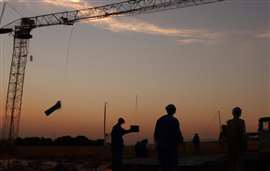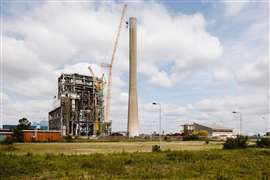How South Africa’s government hopes to tackle its construction corruption problem
26 June 2023
 Image generated with Dall-E-2
Image generated with Dall-E-2
Every construction market around the world suffers from corruption to a greater or lesser degree.
But graft on public works contracts in South Africa has reached such an extent that the government there has vowed to crack down on the problem.
Public works and infrastructure minister Sihle Zikalala has warned contractors and developers that they could be prosecuted and barred from doing any further business with the government if they are caught cheating the public purse.
The message comes amid a spate of construction companies performing shoddy work on public contracts before abandoning the site.
Zikalala announced yesterday (26 June) that 600 cases are under currently under investigation for “extortion by construction mafias”. So far, more than 200 suspects have been arrested.
Earlier this month, he also toured public works projects in Free State Province, which included a visit to an unfinished R232 million (US$12.7 million) correctional service centre in the city of Parys and the unfinished Park Road Police Station in the city of Bloemfontein.
The two facilities have missed their completion date by over four years.
In a statement, the South African government said that the delays were due to a “growing tendency” where construction companies would claim liquidation and incapacity to continue after claiming portions of the public funds.
“The work then gets ceded to a new company which leads to cost escalations and eventually the ballooning of costs and delays in the delivery of key infrastructure,” it added.
Zikalala also called for an audit on all blocked and incomplete projects, estimated to run into the billions of rands.
The minister is expected to meet with the Infrastructure Built Environment Anti-Corruption Forum to assess work to minimise the threat of corruption and fraud within construction.
Zikalala said, “As a government, we can no longer tolerate this tendency of projects being halted due to construction company incapacities.
“We need to have projects delivered on time and within scope. This calls for proper planning, monitoring and consequence management.
“We should not have a project started in 2017 and still incomplete in 2023.”
He cited the example of one project where a total of three different companies have been appointed but the works are incomplete.
“We need to respond to this challenge of failing contractors, especially after some monies have been paid. This is unacceptable,” he added.
He said that one of the “most critical actions” in fighting corruption involved restricting “serial non-performers” from doing business with the government.
“It is high time that we address poor project management in government programmes,” he added.
Corruption ‘widespread’
Construction industry corruption has been a significant problem in South Africa for a number of years.
A 2012 study by researchers at the University of Cape Town and RMIT University in Melbourne, Australia, based on a survey of clients and construction professionals, found that corruption was perceived to be “widespread”.
It found that conflicts of interest, tender rigging, “fronting”, and “kickbacks” were the most common forms of corruption, with government officials working as clients, contractors and sub-contractors perceived to be most involved.
Forms of corruption most associated with government officials included the awarding of contracts for political gain, nepotism and conflicts of interest, as well as interference in the tender award process.
It found that corruption is most prevalent in during the bid evaluation and tendering phases of projects, aided by a lack of transparency in the awarding of contracts.
Meanwhile, potential whistle-blowers were put off by fears of a lack of protection and a lack of confidence in the criminal justice system.
A more recent study by researchers at Nelson Mandela University, published in February of this year found that corruption “continues to overshadow the fundamental contributions of the construction industry”.
It surveyed 270 people and discovered a consensus that bribery exists in the sector and discourages whistleblowing.
They also felt that corruption led to late completion of projects, poor workmanship and the use of sub-standard materials, as well as the appointment of incompetent contractors.
The report recommended efforts to eradicate corruption in the construction industry in order to promote the nation’s economic growth and quality of construction projects.
It called for better protection of whistle blowers, identifying them as a key element in corruption prevention.
It said, “As a recommendation, stakeholders must implement an anti-corruption policy to address and eliminate corruption within organizations or firms. The anti-corruption policy should explicitly outline different forms of corruption, including detailed consequences.
“As part of the policy, a channel must be established for reporting corruption within the organization or firm. For the anti- corruption policy to be effective, harsher punishments must be imposed such as dismissal from employment, revocation of professional registration for at least 5 years, and exclusion from the South African construction industry for at least 5 years.”
STAY CONNECTED


Receive the information you need when you need it through our world-leading magazines, newsletters and daily briefings.
CONNECT WITH THE TEAM











